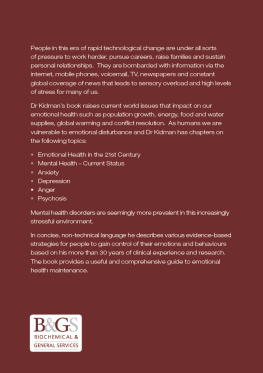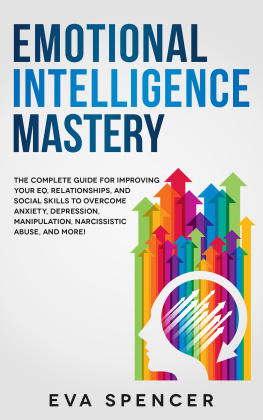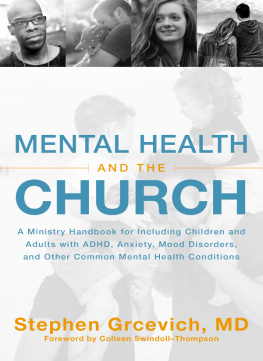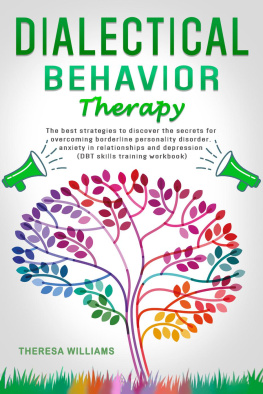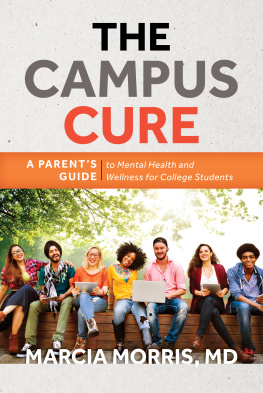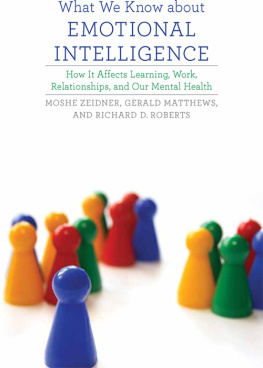Also by the author:
Tactics for Change
A Self Help Manual
From Thought to Action
A Self Help Manual (Second Edition)
Managing Love and Hate
A Self Help Manual
Family Life: Adapting to Change
A Self Help Manual
Stress, Coping and Social Support in the Age of Anxiety
Feeling Better: A Guide to Mood Management
(Second Edition)
Schizophrenia: A Guide for Families
STAYING SANE
IN THE
FAST LANE
Emotional Health in the 21st Century
B & G S
BIOCHEMICAL &
GENERAL SERVICES
ANTONY KIDMAN PhD
Copyright 2011 Antony Kidman
All rights reserved. No part of this publication may be reproduced, stored in a retrieval system, or transmitted in any form or by any means, electronic, mechanical, photocopying, recording or otherwise, without written permission of the publisher.
National Library of Australia
Cataloguing-in-Publication Data
Kidman, AD (Antony David), 1938 .
Staying sane in the fast lane : emotional health in the 21st century.
ISBN 9780958880374 (pbk.).
| Notes: | Includes bibliography references and index. |
| Subjects: | Mental health.
Stress management.
Stress (Psychology). |
Dewey Number: 155.9042
Published by
Biochemical & General Services
PO Box 156, St Leonards NSW 1590 AUSTRALIA
61-2 9438 3828
Designed and produced by
Ron Proft, Delphian Books
61-2 9876 1050
Printed in Hong Kong
ACKNOWLEDGMENTS
I would like to thank my wife Janelle who greatly helped in so many ways to get this book together. These included her rigorous editing and sensible suggestions to clarify and improve the presentation of the topics. I want to thank Ron and Kristina Proft for the design and editorial contributions to the production of this book and thanks to Karla Whitmore for typing the manuscript and suggestions.
ABOUT THE AUTHOR
Antony Kidman AM PhD is a clinical psychologist and directs the Health Psychology Unit of the University of Technology, Sydney. He is an Associate Fellow of the Albert Ellis Institute for Rational Emotive Behaviour Therapy (NY), a Fellow of the International Academy of Cognitive Therapy, an Affiliate Member of the American Psychological Association, a Member of the Australian Association for Cognitive and Behaviour Therapy and a Member of the Clinical College of the Australian Psychological Society. He has been carrying out scientific research and lecturing for more than 35 years and conducting a clinical practice for 25 years. He has more than 145 publications to his name including nine books. He was awarded an Order of Australia in 2005 for his contribution to clinical psychology.
Dr Kidman is a frequent guest speaker on radio and television and writes for the media on health and behaviour. His self-help books Tactics for Change; Managing Love and Hate; Family Life: Adapting to Change; Feeling Better: A Guide to Mood Management; From Thought to Action; Stress, Coping and Social Support in the Age of Anxiety; Schizophrenia: A Guide for Families and Staying Sane in the Fast Lane: Emotional Health in the 21st Century are a result of his research and interest in health and psychology.
PREFACE
I have been working in scientific research for more than 35 years, originally in neuroscience and brain chemistry and then in 1980 I became interested in the brain and behaviour that led me into clinical psychology. In conjunction with colleagues I have published more than 145 scientific papers over the years and have always been keen to get the results of important scientific work in clinical psychology out to the general community.
To that end I have written nine self-help books including this one. In it I discuss global issues that will impact on the mental health of the world's peoples. In the first bring up current world challenges such as poverty in the third world, climate change, massive movement of refugees, international conflict, population growth, the need for food security and water resources, energy requirements and ageing populations in the first world. The IT revolution, the media, work patterns and the rapid changes in our cultural and physical environment that we are subjected to can be difficult to manage and affect our mental health.
reviews the incidence of mental disorders in the community and mental health related hospitalisation. There is a need for substantial increases in funding across the board for mental health, especially for young people. For instance, 11% of visits to GPs are due to psychological problems, depression being the most common, followed by anxiety disorders.
Stigma is still a major problem for people suffering from mental illness. First, public stigma the fear people have of mental illness, especially those with psychosis or schizophrenia. Second, self-stigma whereby a person who receives a diagnosis and a label such as depression, anxiety and especially schizophrenia denigrates themselves because they have a mental illness. A brief history of treatment is presented including drugs, surgery and psychotherapy.
Anxiety and depression are discussed in detail in the next two chapters including medications and a comprehensive explanation of cognitive behaviour therapy (CBT) and how to employ it in the treatment and management of these two most frequent mental disorders.
Managing Your Anger is the title of and this is sometimes thought of as the neglected emotion in psychological research. I discuss this complex emotion in some detail, its causes and consequences and the harm it does to others and oneself in the workplace and at home. Fortunately recent research has found effective ways for people to control their anger and I have detailed them in an anger control section.
Finally I raise the profoundly disturbing condition of psychosis that with recurrence leads to schizophrenia. With an incidence of 0.51% at least 100,000 people suffer from schizophrenia in Australia (both men and women). It has a profound impact not only on individuals but on their families. Symptoms of psychosis are episodic and include hallucinations, such as hearing voices or delusions, for example that people are trying to kill them or that secret agents are following them. They frequently have a loss of motivation and enjoyment and experience social isolation.
The first line of treatment is almost always medication, however in the last 15 years cognitive behaviour therapy has helped many patients manage their symptoms in conjunction with medication more effectively and there have been significant improvements and reduction in symptoms if treatment starts as soon as possible.
The first part of the book deals with the global stresses affecting the planet and the incidence of mental health disorders. Most of the book, however deals with the most common mental health conditions that profoundly disturb individuals and their families such as depression, anxiety, anger and psychosis together with a clear explanation of evidence-based treatments that have helped many patients.
Antony Kidman PhD
April 2011
CHAPTER 1
EMOTIONAL HEALTH
IN THE 21ST CENTURY
T he changes of the last 60 years, covering the second half of the 20th century and the first decade of the 21st, have produced a remarkable transformation in the world. The population that stood at approximately 2 billion in 1950 is now 7 billion. Agriculture developed over thousands of years, industrialisation over several hundred years yet the information technology revolution has taken only a few decades. This onslaught of the computer age and the vast technological changes and devices it has spawned is unparalleled in the history of the world. Perhaps the only comparable advance was the invention of printing but even that took hundreds of years to become a widespread technological process.

